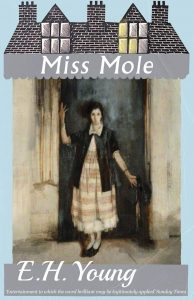 Published by Dean St Press 2 August 2020
Published by Dean St Press 2 August 2020
250pp, paperback, £10.99
Reviewed by Lesley Glaister
E.H. Young’s novel, Miss Mole, written in 1930, features one of the ‘nicest’ literary characters I’ve ever encountered. By ‘nice’ I mean anything but bland. Rather, Hannah Mole is brave, well-meaning, optimistic and warm-hearted as well as being gloriously, humanely and realistically flawed. Hannah is nearing forty and hardly a beauty, having sallow skin, ‘a satirical nose’ and a questionable wardrobe. She’s one of the class of women, who, having no husband or home of her own, is forced to move from situation to situation, the predicament of so many women of her class: ‘A sad multitude … with carefully pleasant faces, hiding their ailments, lowering their ages and thankfully accepting less than they earned.’
An extra pleasurable aspect of the novel comes with Hannah Mole’s quality of observation and the delight she takes in her surroundings and particularly in nature, so that her world, so drab and narrow in some respects, is vibrant with detail and colour: ‘The fall of a chestnut sounded stealthy, as though its descent was a little shameful in the general glory. It lay among the leaves, a glossy roan, bursting from its green spiked shell …’
Early in the novel we see Hannah accept, with trepidation, the role of housekeeper in the home of the recently widowed minister Robert Corder and his two fractious daughters. There’s very little plot, and the most understated, almost subliminal of romances. The interest comes from the interactions between the small cast of characters all of whom are lovingly detailed and complex creations, all quite ordinary and quite extraordinarily rendered, so that the reader becomes fascinated in the smallest and pettiest of their reactions and transactions.
Much of the dialogue is very funny as the characters conceal and reveal their sometimes questionable motivations. It’s a comedy of manners – propriety needs to be respected all times – though part of the comedy comes from Miss Mole’s sense of the absurd and the way she’ll unexpectedly cut through the nonsense to the consternation of her friends. She rehearses and tells jokes, she picks over conversations finding things she wishes she’d said – she’s so human and recognizable she almost makes me wince.
Feeling the lack of children of her own as well as sympathy for the girls, Hannah sets out to win round the tricky Corder daughters’ affection and trust, though once she does she feels the weight of responsibility. This is an admirably subtle reaction, a collision of Hannah Mole’s characteristic optimism and realism: she tells herself that ‘the things she wanted, if she had them, would soon turn into those she wanted no longer – here was God’s happy idea of compensation.’ It is this freshness of thought, this determination not to feel hard done by along with her mischievous sense of humour, that wins over almost everyone Hanna encounters – as well as the reader – so that we really care. When she hits a low point and her sunny nature is temporarily dimmed it feels quite tragic and the mutedly happy ending gives great satisfaction and pleasure.
This is a gentle, slow-moving and compelling novel, which I was sorry to finish. I’m looking forward to reading everything else I can find by E.H. Young.
